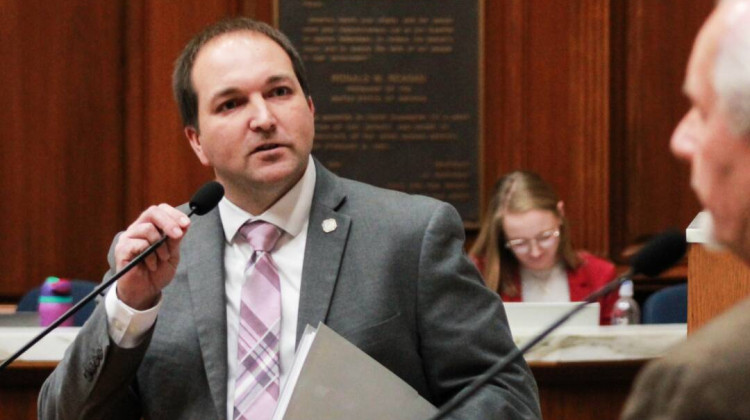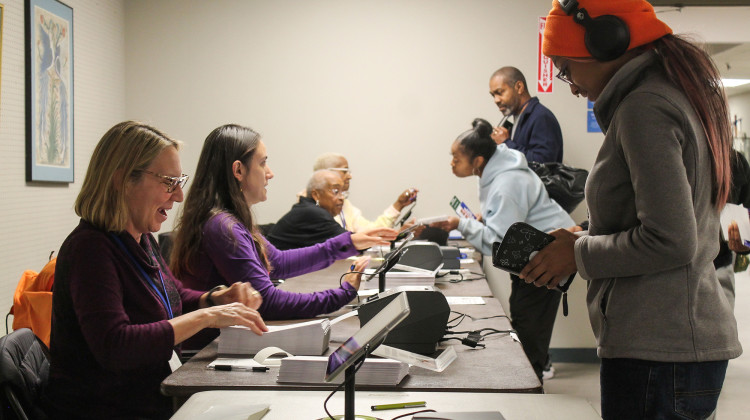One of the few races all Hoosiers get to vote for this election is for superintendent of public instruction. The state superintendent runs the Department of Education and chairs the State Board of Education. In the first of a two-part series looking at the candidates in this race, we look at Republican new-comer Jennifer McCormick.

At a recent meeting of the Yorktown School Board, there’s a lot of smiles and even some laughs.
Held in a small room in the district office in the center of Yorktown, the monthly meeting is a far cry from the Indiana Board of Education, which has now seen four years of tumultuous political debates.
In just 22 minutes, the five members and Superintendent Jennifer McCormick approve the district budget unanimously and review many of the mundane issues a local board like this oversees.
McCormick, noting the light agenda, admits meetings for the A-rated Yorktown district are less exciting than those happening just 15 miles to the east in Muncie where management of the school budget is a charged issue.
Why would McCormick, a former special education teacher turned top administrator, seek the office of the state superintendent of public instruction, an elected position that has drawn heated Statehouse debates and national scrutiny?
“You know I was very frustrated for the last couple of years,” she says. “So it was one of those moments we teach our own children and we teach our own students, that if you’re going to change something you either need to step up and try to fix it or at some point keep your mouth shut.”
McCormick claims the Indiana Department of Education has become too political and needs better leadership. She cites her career as a teacher, elementary school principal and the past 10 years as an assistant superintendent and superintendent as why she makes a good candidate.
“It is broken,” she says.
She faults State Superintendent Glenda Ritz for poor communication to school districts and politicizing the office. She says Ritz has caused rifts with local school leaders and her actions have lead lawmakers and the governor’s office to ignore her input.
“For me this is not about a party, it’s not about a true party alignment for me it’s about the party of students,” she says.
But Ritz supporters don’t believe McCormick’s position.
They’ve labeled her as a copy of the previous Republican state superintendent, Tony Bennett. With the backing of the GOP-led Statehouse, Bennett championed divisive school reform measures, like private school vouchers and the state-takeover of chronically failing schools.
The Indiana State Teachers Association has told its members if McCormick wins, it will be a “return to the Tony Bennett era.”
Anti-McCormick campaign videos online describe her as beholden to campaign donors, many of whom previously donated to Bennett.
There’s even a music video where the faces of McCormick and Bennett are superimposed on the actors dancing and embracing each other to the song “The One That I Want,” from the musical Grease.
Those accusations and images make some supporters frustrated.
Tom Simpson, the president of the Yorktown School Board and a Republican, says McCormick will be a leader without bending to partisan ideology.
“I think one side wants to paint it that: [Ritz] is the pro-teacher, anti-voucher candidate and here’s Dr. McCormick who is, you know, pro-voucher, and is another Tony Bennett,” Simpson says. “And that is a ludicrous comparison. As the [state] superintendent she’s got to do everything she can to support public schools and that is exactly what she will do.”
Supporting public schools means, supporting plans that are pretty similar to Ritz.
McCormick wants to: replace the ISTEP with less standardized testing; tweak the school funding formula to help poor and rural schools; and not just pay teachers more, but show them respect.
She also wants an investment of $10 million into broadband access for schools, similar to improvements for state roads.
Ritz and Democratic gubernatorial candidate John Gregg have made a proposed universal pre-kindergarten, funded at $150 million per year, a centerpiece of their campaign.
McCormick supports a long-term goal of state-funded, universal pre-school — but says Ritz’s plan for an instant expansion is too fast, too soon.
“I think our approach to things is just very different. I’m more of a planner. I’m more of a you got to look at the unintended consequences. I feel like right now that’s not what Indiana is doing,” McCormick says. “We’re just rolling things out and hoping for the best. But some of that goes back to if you don’t have the experience as a superintendent or as a building level administrator sometimes you don’t understand the impact that that’s going to have on districts.”
McCormick also diverges from the school reform policies championed by many Republican lawmakers.
For the rewrite of the school accountability system, GOP gubernatorial candidate Eric Holcomb wants a single A-to-F grade. McCormick says multiple grades for each school — something like a report card — would be offer deeper insight.
“How we attached one letter grade — maybe there is multiple layers to how you arrive at that and that ought to be known — but you can’t go back to the days where we simply don’t know where it’s a question mark,” Holcomb said last month when asked about McCormick’s plan. “There has to be a measurement. And A-F is a way we can get there.”
While McCormick says she will support the school choice laws in place, she wants more transparency in how the voucher program is funded. An idea, some Republicans have resisted when sought by Democrats.
The state spent $131.5 million on the Choice Scholarship Program in 2015-16, $18 million more than last school year, according to a state DOE report. But the cost has been disputed by some voucher advocates.
In 2015, the General Assembly removed the requirement for the IDOE to calculate the cost of the program, but Ritz has continued to release the information.
“Are the results there that that support that funding of the programs. But I would say that’s true of any program that is you know involving K-12 dollars,” McCormick says. “I would like to see [voucher scholarships] appropriated separately just because I know how much of a struggle many of our K-12 schools are having. And so any funds that pull away from that it causes more struggle for some of our schools.”
Even as McCormick’s language has mirrored some of her opponents, such as blaming the state’s fast-paced school reform policies for contributing to a teacher shortage, it’s not a concern for those supporting her campaign.
The Indiana Chamber of Commerce is endorsing her. Chamber President and CEO Kevin Brinegar said McCormick would have “more effective relationships with the key players as far as the legislature” than Ritz.
Betsy Wiley, the CEO of Hoosiers for Quality Education, said McCormick would enforce policies already in place. The group has been critical of Ritz and its PAC has given $70,000 to McCormick’s campaign. The group has supported expansion of vouchers and other school choice policies.
Despite Indiana being seen as a leader in school reform, Wiley said, Ritz has not properly managed some of the programs.
Wiley cited mis-payments of federal funds to charter schools and overpayments to some districts, such as Indianapolis Public Schools.
Ritz, during a debate this month, said the payment problems happened before she became state superintendent and that McCormick was wrong to suggest that local schools don’t know how the funding calculations are made.
“The calculations are online, so the calculations are out there and have been out there,” Ritz said. “In fact, they’re required to be out there.”
With just a short time before the election, McCormick says her biggest challenge is reaching voters with her message of bipartisan leadership at the Department of Education.
“There is no hidden political agenda it’s just to try to — it can only get better,” McCormick says. “I mean it’s such a mess described that way across the state of Indiana that really is just an opportunity to try to help the students and educators of Indiana.”
Ritz has refuted McCormick’s claims, saying she talks with local schools every week and has overseen a reduction in failing schools statewide.
 DONATE
DONATE






 View More Articles
View More Articles





 Support WFYI. We can't do it without you.
Support WFYI. We can't do it without you.